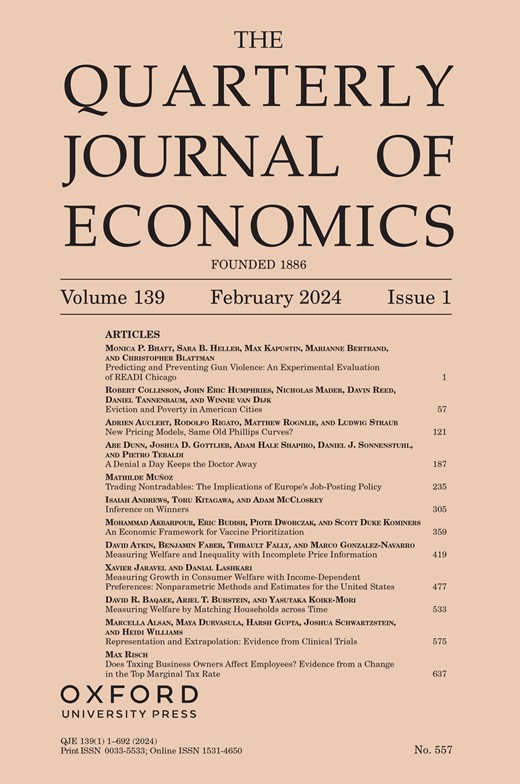Unemployment Insurance and Job Search Behavior*
IF 12.7
1区 经济学
Q1 ECONOMICS
引用次数: 11
Abstract
Unemployment insurance (UI) can affect unemployment duration and re-employment wages, through various dimensions of unemployed workers’ job search behavior. We shed light on the effects of UI on job search behavior using new longitudinal data: we link administrative registers to data from a major online search platform, and track the job applications sent over the unemployment spells of about 500,000 French workers. We identify changes in individual search behavior caused by UI around benefits exhaustion, after accounting for changes in the sample composition—i.e. dynamic selection—and for the effect of the time spent unemployed—i.e. duration dependence. We show that search effort (the count of job applications) increases by at least 50% during the year preceding benefits exhaustion and remains relatively high thereafter. The target monthly wage decreases by at least 2.4% during the year preceding benefits exhaustion, and remains relatively low thereafter. We document particularly large dynamic selection around benefits exhaustion, as some workers increase their search effort more before exhaustion and find a job faster. We also show evidence for duration dependence: workers decrease their target wage by 1.5% over each year of unemployment, irrespective of their UI status. Overall, the effect of UI on individual search behavior is consistent with the predictions of search models and constitutes evidence against search-free models where UI merely subsidizes leisure.失业保险与求职行为*
失业保险可以通过失业人员求职行为的各个维度影响失业期限和再就业工资。我们使用新的纵向数据揭示了用户界面对求职行为的影响:我们将行政登记与主要在线搜索平台的数据联系起来,并跟踪在约50万法国工人失业期间发送的求职申请。在考虑了样本组成的变化(即动态选择)和失业时间的影响(即持续时间依赖性)后,我们确定了福利耗尽前后用户界面导致的个人搜索行为的变化。我们发现,在福利耗尽前一年,搜索工作量(求职人数)至少增加了50%,此后保持相对较高的水平。在福利耗尽前一年,目标月工资至少下降2.4%,此后仍相对较低。我们记录了围绕福利耗尽的特别大的动态选择,因为一些员工在耗尽之前会加大搜索力度,更快地找到工作。我们还展示了持续时间依赖性的证据:工人在失业的每一年中,无论他们的UI状态如何,他们的目标工资都会下降1.5%。总体而言,用户界面对个人搜索行为的影响与搜索模型的预测一致,并构成了反对用户界面仅补贴休闲的无搜索模型的证据。
本文章由计算机程序翻译,如有差异,请以英文原文为准。
求助全文
约1分钟内获得全文
求助全文
来源期刊

Quarterly Journal of Economics
ECONOMICS-
CiteScore
24.20
自引率
2.20%
发文量
42
期刊介绍:
The Quarterly Journal of Economics stands as the oldest professional journal of economics in the English language. Published under the editorial guidance of Harvard University's Department of Economics, it comprehensively covers all aspects of the field. Esteemed by professional and academic economists as well as students worldwide, QJE holds unparalleled value in the economic discourse.
 求助内容:
求助内容: 应助结果提醒方式:
应助结果提醒方式:


